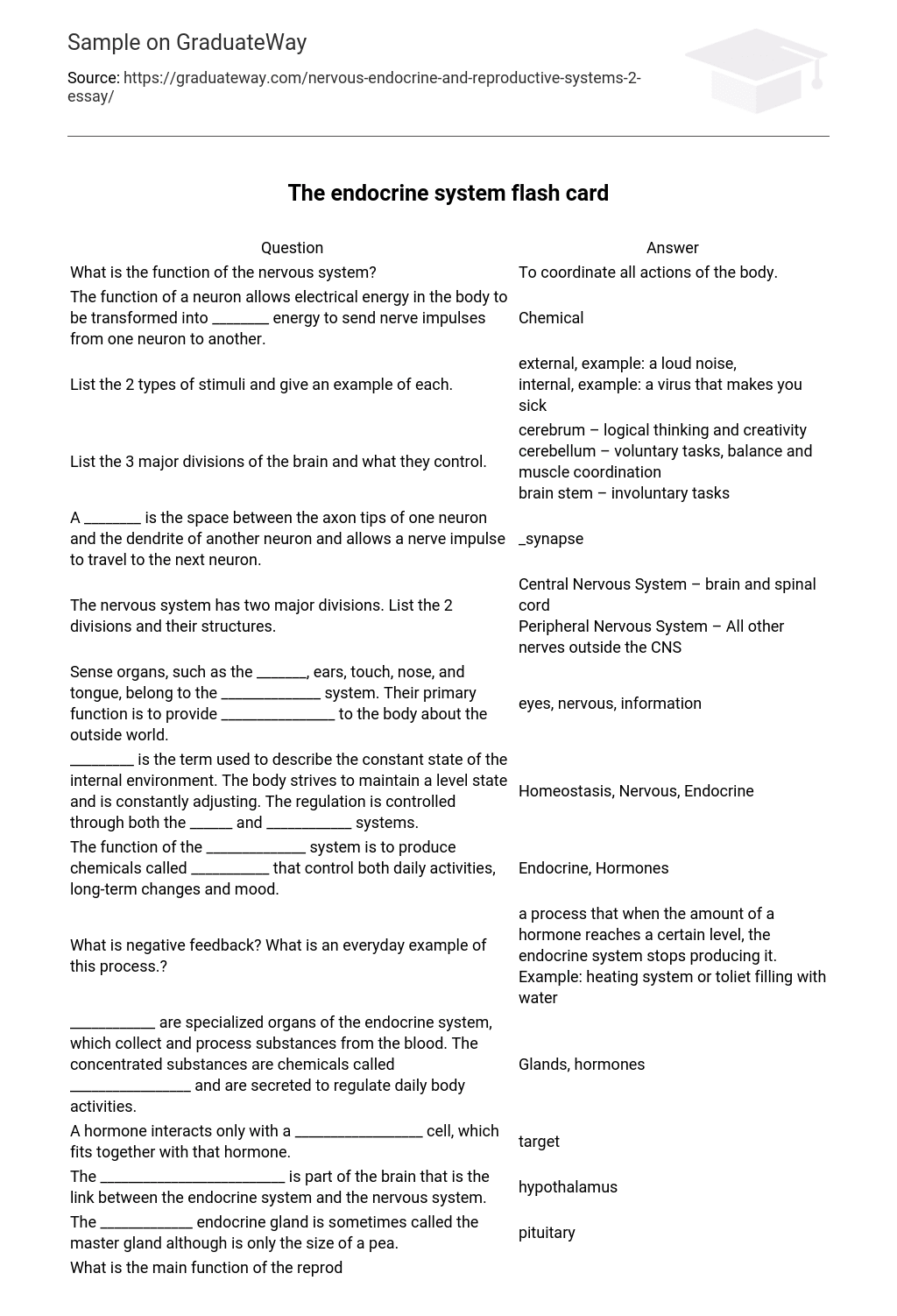| Question | Answer |
|---|---|
| What is the function of the nervous system? | To coordinate all actions of the body. |
| The function of a neuron allows electrical energy in the body to be transformed into ________ energy to send nerve impulses from one neuron to another. | Chemical |
| List the 2 types of stimuli and give an example of each. | external, example: a loud noise, internal, example: a virus that makes you sick |
| List the 3 major divisions of the brain and what they control. | cerebrum – logical thinking and creativity cerebellum – voluntary tasks, balance and muscle coordination brain stem – involuntary tasks |
| A ________ is the space between the axon tips of one neuron and the dendrite of another neuron and allows a nerve impulse to travel to the next neuron. | _synapse |
| The nervous system has two major divisions. List the 2 divisions and their structures. | Central Nervous System – brain and spinal cord Peripheral Nervous System – All other nerves outside the CNS |
| Sense organs, such as the _______, ears, touch, nose, and tongue, belong to the ______________ system. Their primary function is to provide ________________ to the body about the outside world. | eyes, nervous, information |
| _________ is the term used to describe the constant state of the internal environment. The body strives to maintain a level state and is constantly adjusting. The regulation is controlled through both the ______ and ____________ systems. | Homeostasis, Nervous, Endocrine |
| The function of the ______________ system is to produce chemicals called ___________ that control both daily activities, long-term changes and mood. | Endocrine, Hormones |
| What is negative feedback? What is an everyday example of this process.? | a process that when the amount of a hormone reaches a certain level, the endocrine system stops producing it. Example: heating system or toliet filling with water |
| ____________ are specialized organs of the endocrine system, which collect and process substances from the blood. The concentrated substances are chemicals called _________________ and are secreted to regulate daily body activities. | Glands, hormones |
| A hormone interacts only with a __________________ cell, which fits together with that hormone. | target |
| The __________________________ is part of the brain that is the link between the endocrine system and the nervous system. | hypothalamus |
| The _____________ endocrine gland is sometimes called the master gland although is only the size of a pea. | pituitary |
| What is the main function of the reproductive system? | to allow offspring to be born |
| The ______________ produce and secrete hormones in addition to releasing eggs in a female. This function makes them part of both the __________________ and _______________________ systems. | ovaries, endocrine, reproductive |
| The main function of the testes and ovaries are the produce _______ cells, which join to from a ______________. | sex, zygote |
| Human eggs are usually fertilized in the female’s oviduct or _______________ ________. | fallopian tubes |
| What happens during fertilization? | a sperm and an egg join together |
| The structure formed during fertilization is call a | zygote |
| The main event that occurs in puberty is that an individual is able to __________________. | reproduce |
| List the 3 stages of birth. | labor, delivery, afterbirth |
| The stages of development that occur after fertilization in order are: ___________________, _____________________, _______________ |
zygote, embryo, fetus |
| The _______________ and ________________ systems work together to produce offspring because hormones play a vital role in the production of sex cells. | endocrine, reproductive |
The endocrine system flash card
Cite this page
The endocrine system flash card. (2017, Nov 20). Retrieved from
https://graduateway.com/nervous-endocrine-and-reproductive-systems-2-essay/





